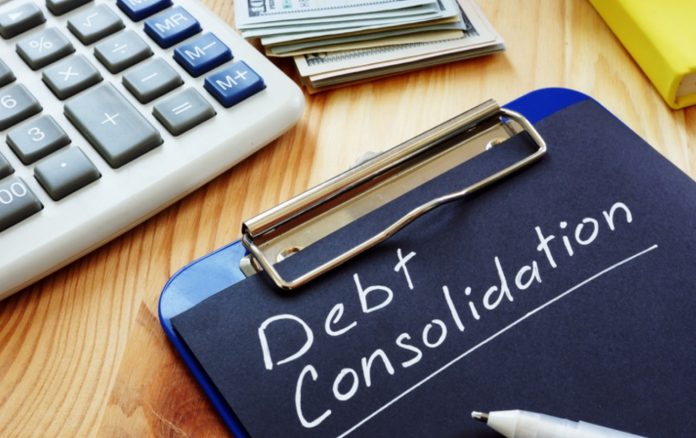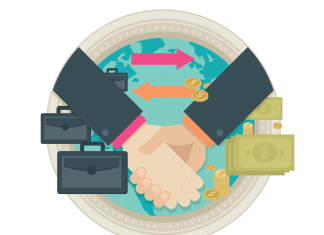The term “debt consolidation” is used to describe when a person pays off existing loans or credit card debt through another loan or credit card.
This action, which allows people to combine multiple debts into a single but larger loan, brings different benefits, including lower monthly payments, lower interest rates, or both.
Debt consolidation has become very popular among people who want to start putting money into a savings account but have too much credit card debt.
However, you should consider certain aspects before consolidating your debt. Here’s all the information you need to know.
Overview
- Taking out new loans or credit cards to pay off multiple debts is known as “debt consolidation.”
- Debt consolidation offers different benefits, such as a lower monthly payment and a lower interest rate.
- You can use a personal loan, balance-transfer credit card, or home equity loan to consolidate your debt.
- Debt consolidation may have several pitfalls.
- Debt consolidation and debt settlement aren’t the same.
Types of Debt Consolidation Loans
You can use different types of loans and credit cards to consolidate your debts. However, determining which debt consolidation loan will be the best option depends on several factors, including your current loans and financial situation.
Overall, there are two main types of debt consolidation loans, which are secured and unsecured loans.
Secured loans are loans backed by an asset that serves as collateral, such as your home. Contrastingly, unsecured loans are not backed by any good or belonging.
As such, unsecured loans are more difficult to get. To qualify for these types of loans, you must agree to pay a higher interest rate, for example. People must also have an impeccable credit history to get these loans.
However, both types of debt consolidation loans tend to have lower interest rates than credit cards. In fact, most options have fixed interest rates.
Also, whether you choose a secured or unsecured debt consolidation loan, you must prioritize which of your debts you want to pay off first. Most people get started with the debts that carry the highest interest rates.
Most Common Debt Consolidation Options
Do you think a debt consolidation loan is what you need to pay off your debts, even if it may slightly hit your credit score? These are the available options.
Personal Loans
A personal loan is a type of unsecured loan that you can get from a credit union or bank. These entities provide a lump sum payment (personal loan) that you can use to pay off your debts.
Personal loans usually have lower interest rates. In addition, you can make monthly payments for a specific period to repay these loans.
Credit Cards
If it offers low-interest rates, a credit card can also be a good debt consolidation option. However, remember that credit cards may impose initial fees, accounting for up to 3-5% of the amount you transfer.
Home Equity Loans
Are you a homeowner? Have you built up equity over the years? If so, home equity loans or a home equity line of credit (HELOC) could be great alternatives for debt consolidation.
These secured debt consolidation loans use people’s equity as collateral. However, interest rates are often below average mortgage rates if you choose this option.
Student Loans
The federal government also offers a few debt consolidation options for people with student loans. Direct consolidation loans offered by the Federal Direct Loan Program fall into this category.
In addition, you’ll have a new interest rate, which is the average of the interest rates of your previous loans.
When you have a federal student loan, you can make a lower monthly payment by stretching the repayment period up to 30 years. However, as a result, you could pay more money in total interest over the years.
If a private loan doesn’t qualify for this program, you may want to consider another private loan for debt consolidation.
Are Business Loans Eligible for Debt Consolidation?
Overall, people can consolidate business debt with a business consolidation loan, but this option is not available to everyone.
In addition, you must meet strict requirements to be eligible for business debt consolidation.
Understanding How Debt Consolidation Works
Do you plan to roll over your old debt into new debt? There are many options to consider. As mentioned, you can take new personal loans, new credit cards with a higher credit limit, or home equity loans to pay off your smaller loans.
There are many ways to consolidate your credit card debt with new credit cards, for example. You just have to transfer your balances on your old credit cards to your new one.
If you choose balance credit cards, you can get some incentives, like a 0% interest rate on your balance for a specific period.
However, there’s more than just lower interest rates. Debt consolidation can be one of the best ways to make your personal and financial life easier since you’ll have fewer bills to pay monthly.
Furthermore, debt consolidation is not only beneficial for those who want to pay off debts. Consolidating your debt can also favor creditors.
That’s why many creditors work with people on debt consolidation to make sure they can repay what they owe them. You might want to check more info about Americor debt consolidation before applying for any consolidation loan available on the market.
Are There Any Risks Associated With Debt Consolidation?
While debt consolidation offers many benefits, there are also some downsides. Taking debt consolidation loans can affect your credit score, for example.
In addition, there are also some risks associated with how you consolidate your loans. A few people who take a debt consolidation loan with lower monthly payments, but longer repayment terms mean you may end up paying much more money over time.
What Happens With Your Credit Score?
While taking a debt consolidation loan can hit your credit score, these loans may help your credit history over the long term.
When you must make a lower monthly payment, you can pay the loan off sooner, which often results in a higher credit score.
Consequently, if you have a higher credit score, you can be approved for creditors and have a better interest rate.
However, you should always remember that rolling over your current loans into brand new loans will always negatively affect your credit score first. This happens because credit scores benefit older debts when people have long and consistent payment histories.
Also, you must use debt consolidation correctly if you want it to help your credit score in the long term. If you make new payments on time, your credit score will probably increase.
How to Know If You Qualify for Debt Consolidation
Most lenders set income and creditworthiness standards to grant loans, including personal loans. Therefore, borrowers must have a good credit history. Personal finance also plays a key role in this process.
Overall, a person who wants to obtain a debt consolidation loan must demonstrate that they have a high credit score and provide the following:
- Letter of employment or proof of income
- Two months’ worth of credit card or personal loan statements (for each loan they want to pay)
- Letter from creditors or repayment agencies
Is Debt Consolidation the Same as Debt Settlement?
No, it isn’t. Both terms are different. Debt settlement reduces consumers’ financial obligations. It doesn’t lower the number of loans.
Instead, people work with debt-relief organizations to settle their debts.
Final Thoughts – Debt Consolidation Can Help You Put Money Into Your Savings Account
Even if you run a big or small business, putting money into your savings account is almost impossible when you have too much debt. Fortunately, debt consolidation can be the best solution.
While getting a new personal loan to pay off your existing debts can impact your credit score initially, it can also improve your personal and financial life in the long run and even help you increase your credit score over time.
Also, there are many debt consolidation options. You can consolidate your debt in different ways, such as through a personal loan.
However, you must consider several aspects to develop a good strategy, such as your financial situation.
Disclaimer: This article contains sponsored marketing content. It is intended for promotional purposes and should not be considered as an endorsement or recommendation by our website. Readers are encouraged to conduct their own research and exercise their own judgment before making any decisions based on the information provided in this article.



































































